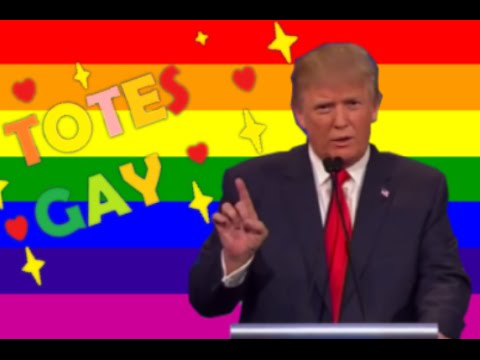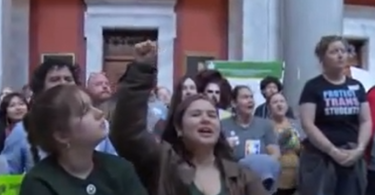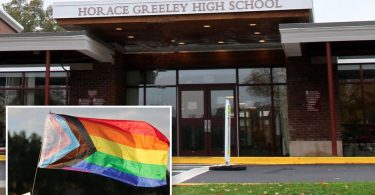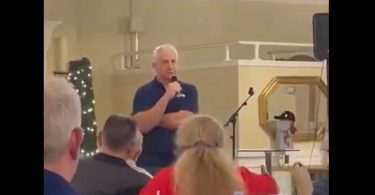My husband and I knew when we picked Nov. 12 to be married, we ran the risk of doing so in Donald Trump’s America.
An America led by a man who was met with cheers as he incited violence at his rallies, who openly mocked a disabled reporter, who boasted that he could shoot someone in the middle of Fifth Avenue without losing a vote, who equated the daily lives of African-Americans and Hispanics to living in hell, who called for Muslim bans and registrations, who praised murderous, foreign dictators, who openly degraded women as he dismissed their sexual assault, and who named arguably the most anti-LGBT politician in decades as his running mate.
We knew the election would be Tuesday and our ceremony, a celebration that love had won, would follow Saturday. But surely Nov. 8 would be a day that love trumped hate and the nation said yes, we are stronger together.
It wasn’t. The nation (in reality, the Electoral College — as Hillary Clinton continues her historic lead of over 1 million in the popular vote) didn’t say that love trumped hate, and it didn’t say that we were stronger together. It said that America only used to be great, and that dark, orange days lie ahead.
Four days before our wedding, Donald Trump became the president-elect of the United States.
Like many Americans, when he was declared the victor, I was hurt. Confused. And admittedly, a little drunk. (My friends and I knew we needed to be with our community during the returns, for either celebration or comfort. As state by state flashed red, we learned it would be the latter.)
The wedding was nearly upon us, loved ones were commuting, plans were being obsessively finalized, and I was working extra hours to stockpile time off for the ceremony. I was mentally drained already and hadn’t emotionally prepared for the same country that had finally given me the right to marry to hand the keys to the White House to a demagogue.
I was never perfect, but I’d spent months trying to only disagree respectfully with those that I knew were voting Trump or for a third party, watching my tone and words. I tried to make it clear who I was supporting, and why, and had even joked on Election Day to a Trump-supporting co-worker that I was looking forward to the best woman winning. We laughed together: While I feared it, my optimism and perhaps naïve view of America told me that Trump couldn’t win.
Like many children, grandchildren, friends and co-workers, I felt betrayed by people I love and respect when I learned of his victory — by those who love and respect me, and wished nothing but the best for my marriage. I couldn’t understand how anyone I knew could vote for a man who had threatened not only my rights, but the rights of so many other minorities — who had demonized most of America, to say nothing of his treatment of women.
I freely admit that when the race was called, I lost my mind. Perhaps it was wedding stress, or the time I’d spent trying to be respectful and hoping it changed hearts, if not votes. It also could’ve been the beer.
I attacked third-party voters, and then Trump supporters. My rage overtook me: They had either enabled a xenophobic, misogynistic racist, or they were one. I criticized them all via social media, and quite blatantly.
In my despair and against my now-husband’s wishes, I uninvited them to our wedding. Supporting Trump wasn’t supporting our marriage, and the pain was too fresh. I didn’t know these voters and I didn’t know this country.
The next morning I deleted most of the evidence I’d left behind. The damage had been done, but in my shame it was comforting. The feelings I’d expressed were genuine, but their execution appalling. The world reconfirmed that Trump was the president-elect, with three days remaining before my wedding. I was living in a nightmare and simultaneously living my dreams. It was, at best, conflicting.
If I’d ever truly believed we were a nation that was stronger together, I knew I had to apologize. I reached out to those I’d offended with my words, particularly for their extremity. I explained that we’d fought so hard for marriage equality that the notion of losing it was terrifying and rage-inducing, particularly so close to my own wedding. I asked for understanding and, if applicable, their attendance. (Most obliged, including my wonderful cousin and several dear friends.)
On our wedding day, I was too busy to think about the election, and in the crowd I didn’t see Republicans or Democrats. I didn’t see supporters of Trump or Clinton. I saw people who loved us (or at least wanted access to an open bar).
Don’t get me wrong: The orange elephant in the room was pointed out early. My husband vowed during the ceremony to support me in dark times, like a Trump presidency, and I vowed to listen to him more (citing that I’d uninvited people that cared about us over an election, despite his protests.)
When I grabbed my husband’s hand, when I put the ring on his finger, when I said “I do,” I knew that despite Trump’s divisive rhetoric and even my own in response to the election results, love had still won.
His supporters didn’t cheer less, nor did they dance less at the reception. (To be fair, the open bar may have helped that, too.) On Nov. 12, we had love and we had unity.
But every day is not Nov. 12, and our Nov. 12 was very different from the one experienced by those were understandably dejected or afraid.
True unity is not a president-elect who appoints a white nationalist as his chief strategist. Unity is not unlawful deportation. Unity is not the countless reports of hate toward minorities across this country since his election. Unity is not a president-elect who is “fine” with same-sex marriage because it’s “settled law” — while moments later rejecting another “settled law” in Roe v. Wade.
It is not calling the immoral internment of Japanese-Americans during World War II a precedent for Muslim registration. It’s not a president-elect tapping an anti-Muslim congressman to be the CIA director, or an anti-equality senator, a man who has called civil rights groups “un-American” and received a zero on the Human Rights Campaign’s congressional scorecard, to serve as attorney general.
Nov. 12 taught me that life and love will still happen in Trump’s America, and that the support and empathy we felt from Trump supporters can still exist in this country. Their attendance meant the world to me, and I love them, but their support and empathy did not equate to action. It did not stop a Trump administration, and there’s no guarantee that love and empathy will ever equate to action as his administration comes for minority after minority.
We must remember that the majority of voting Americans rejected Donald Trump, and that everyone deserves to feel the safety, love and warmth that my husband and I felt on our wedding day. We must fight to make sure that they have it, now more than ever. I will, my husband will, and I hope you will, too.
We will have our allies, and we will welcome them with open arms, but it isn’t their responsibility to save us. When you come for one minority, you come for us all — that is the unity America must have now: the unity of the marginalized, of the minorities, unafraid to oppose xenophobia, homophobia, misogyny, racism and intolerance.
Unafraid to oppose Donald Trump’s America, and unafraid to oppose Donald Trump.







